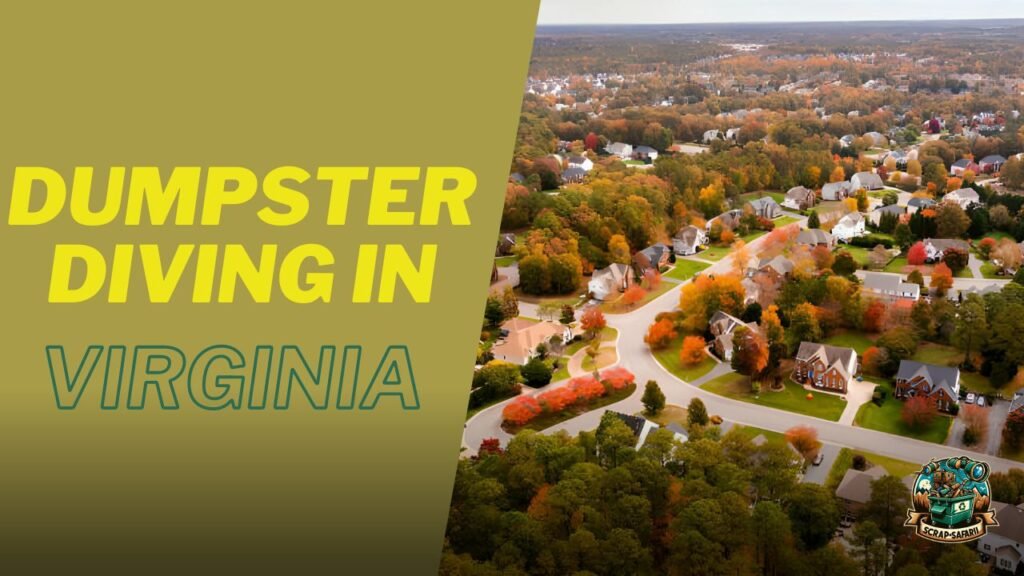Dumpster diving involves searching through commercial or residential waste containers for valuable items that have been discarded.
Often referred to as “urban foraging” or “trash picking,” dumpster diving allows people to collect free items for personal use or resale.
While it is frowned upon and widely considered taboo, it is generally legal to Dumpster Diving in Virginia.
However, dumpster divers still need to be cautious of local ordinances and trespassing laws that may restrict the practice or impose penalties in certain municipalities.
Overall, Virginia offers ample opportunities for willing dumpster divers to salvage usable goods from the trash with minimal risk of facing legal consequences.
If divers avoid private property and respect local rules, scavenging through dumpsters can yield surprises.
This guide will overview essential laws and provide tips for safe and successful dumpster diving throughout Virginia.
🗑️ Take Our Dumpster Diving Survey!
Have you ever gone dumpster diving or found hidden treasures in unexpected places? We want to hear your story! Fill out our quick 2-minute survey and help shape the future of scrapsafari.com content.
Is Dumpster Diving Legal in Virginia?
Unlike some other states, there are no laws at the state level in Virginia that prohibit or restrict the practice of dumpster diving. Virginia has not passed any statutes making it illegal to go through the trash left in dumpsters, meaning there are no criminal penalties at the state level for searching through dumpsters or keeping discarded items found within them.
This lack of state laws banning dumpster diving makes Virginia an attractive destination for the practice. Scavengers and freegans can dig through dumpsters without worrying about breaking state laws. If other legal considerations like trespassing are avoided, dumpster divers can freely go through the trash and keep any finds in Virginia.
However, while state laws do not prohibit dumpster diving, some local ordinances that restrict digging through waste containers have been passed in certain Virginia jurisdictions. Dumpster divers should research local regulations before planning dumpster diving outings. But overall, the legal status of dumpster diving in Virginia is more permissible than in many other states due to the lack of bans at the state level.
Local Ordinances For Dumpster Diving in Virginia
While no statewide laws in Virginia prohibit dumpster diving, some localities have regulations about trash scavenging that divers should be aware of.
For example, certain cities may prohibit rummaging through residential trash cans left out on the curb. Some ordinances disallow removing recyclables from municipal recycling bins.
Additionally, a few jurisdictions require dumpster divers to get explicit permission from a business owner before searching their commercial dumpster. Failure to do so could potentially be considered trespassing.
It’s a good idea to check if the locality you plan to dumpster diving in has any relevant regulations. While enforcement of these ordinances seems rare, it’s best to know the lay of the land.
With research and common sense, dumpster divers can avoid violating local laws. Simply being respectful and not making a mess goes a long way.
Trespassing and Privacy
Although dumpster diving is legal in Virginia, you still need to be cautious of laws related to trespassing on private property. Dumpsters behind locked fences or within private property boundaries should be avoided, even if they seem accessible from public areas like parking lots or alleys.
Remember that business owners have a reasonable expectation of privacy for trash containers out of public view, usually within enclosures or behind buildings. Rummaging through these dumpsters without permission could potentially result in trespassing charges.
Do not wander onto private property or between buildings when accessing dumpsters in apartment complexes. Stick to bin areas in public parking lots or near streets. Apartment tenants also expect privacy when taking trash to community dumpsters.
The safest approach is to only scavenge from trash containers located in publicly accessible spaces, not enclosures or private property. While the contents may be considered abandoned, the container itself is still under the control and ownership of someone else. Avoid causing damage or making a mess, and do not trespass to access a tempting dumpster.
Best Places For Dumpster Diving in Virginia
Some of Virginia’s best places to dumpster diving are large public locations like strip malls, apartment complexes, and shopping centers. These areas often have multiple dumpsters from different stores and residents, giving you a variety of potential finds.
Strip malls provide access to the dumpsters of several retail stores without having to travel all over. Check the dumpsters behind apparel stores, bookstores, pet supply shops, sporting goods stores, and more. There may be lightly damaged goods, unsold merchandise, or packaging materials to salvage.
Apartment complexes can yield decent dumpster diving as well. With high resident turnover, you can often find gently used furniture, household items, and clothing. Be sure to go during move-in/move-out weekends for a treasure trove of discarded goods. Choose larger complexes over smaller ones for more dumpsters to pick through.
Grocery Stores
Grocery stores can be prime dumpster diving locations in Virginia. The large amount of food waste from spoilage and damaged packaging means dumpsters behind grocery stores are often full of edible, usable food.
Popular Virginia grocery store chains like Kroger, Harris Teeter, Food Lion, and Aldi all have multiple locations across the state. Their dumpsters can yield discarded food from produce, dairy, baked goods, and meat. The key is to dumpster diving after the store’s closing so all the expired or unsaleable items from that day have been thrown out.
Some things to keep in mind when dumpster diving behind Virginia grocery stores:
- Focus on non-perishables and food that is sealed or looks fresh. Avoid rotten produce or meat.
- Be aware of trespassing laws and only dive-in dumpsters you can access legally. Avoid employee-only areas.
- Make sure to close dumpster lids and leave the area clean so as not to make a mess for store employees.
- Go with a friend for safety and help sorting through the contents.
- Bring gloves, bags, a flashlight, and hand sanitiser.
With some planning and common sense, grocery store dumpsters can provide a steady source of usable food and other potential finds for Virginia dumpster divers. Just be respectful, safe, and aware of relevant local laws.
Retail Stores
Retail stores can be great dumpster diving targets in Virginia. The dumpsters behind chain stores often contain lightly damaged or expired goods that get thrown out even though they may still be usable.
Some of the top retail stores for dumpster diving in Virginia are:
- Craft stores (Michaels, JoAnn Fabrics, Hobby Lobby) – You can often find discarded scrapbooking supplies, fabrics, unfinished craft projects, and more. Check dumpsters a day or two after the holidays for extra craft materials.
- Office supply stores (Staples, Office Depot) – Look for gently used office furniture, expired printer ink, and paper/stationery supplies. The dumpsters here get incredibly full after the back-to-school shopping season.
- Department stores (Target, Walmart, Kohl’s) – You may find clothes, shoes, home goods, electronics, toys, and more. Be aware of food waste mixed in from grocery sections. The best times are after holidays and inventory turnover seasons.
- Home improvement stores (Lowe’s, Home Depot) – Hardware, fixtures, lumber cut-offs, tools, and building materials often get tossed after projects or remodeling. Time it right after big holidays.
The key is checking dumpsters routinely and being strategic about when inventory gets tossed out. Pay attention to seasonal items and holiday-related merchandise especially. And always abide by dumpster diving laws and etiquette.
Restaurants
Dumpster diving behind restaurants can be a treasure trove for edible food and other valuable items. Restaurants tend to throw away a lot of unused ingredients, prepped foods, and packaged items.
Some things to look for behind restaurant dumpsters include:
- Unused bread, bagels, muffins, and pastries – These are often thrown out at the end of the day or week. They may be unpackaged but still fresh and edible if protected from rain.
- Prepared ingredients – Sliced veggies, potatoes, salad mixes, and more are tossed when unused. Much is still fresh and OK to take home.
- Packaged and canned goods – Unopened sauces, dressings, and jarred items are regularly discarded when not used by the expiration date. These are usually fine to take.
- Leftover buffet trays – At catering restaurants or those with buffets, you may find large platters of untouched food tossed at closing time.
- Damaged packaging items – Restaurants throw away things with ripped bags or dented cans, even if the food is okay.
Check dumpsters shortly after closing time to access the best inventory. Be prepared to sort through some not-so-pleasant bags of waste. Restaurant diving often yields an array of exciting foods if you invest time and effort.
Best Cities
Richmond
As Virginia’s capital and most populated city, Richmond offers great dumpster diving opportunities. With over 230,000 residents, plenty of grocery stores, restaurants, apartment complexes and retail shops generate a high volume of discarded goods. Areas like Carytown and Shockoe Bottom have many shops and eateries concentrated together, making it convenient to hit multiple dumpsters in one trip. The large student population also means many move-ins and move-outs during summer and holidays when furniture and other household items are tossed. Overall, Richmond’s size, density, and demographics make it one of Virginia’s top spots for dumpster diving.
Virginia Beach
Virginia Beach has nearly 500,000 residents, making it the largest city in the state. All those people mean lots of grocery stores like Food Lion, Kroger and Harris Teeter with high volumes of perishables and expired foods ready for picking. Many big box retailers like Walmart, Target and Best Buy receive frequent shipments and discard returned or damaged merchandise. Heavy tourism also generates waste from all the hotels, restaurants and beach shops along the oceanfront. The high density of stores and hotels concentrated along major corridors provides plenty of dumpster diving options. Just be aware of ordinances related to digging on the beach.
What to Look For
Dumpster diving in Virginia can yield a variety of potential finds. Here are some of the most common and valuable things to look for:
Food
Grocery stores, restaurants, bakeries, and convenience stores will often throw away edible food that is past its sell-by date. This discarded food, usually found in dumpsters, can include produce, prepared foods, packaged goods, baked goods, and more. Check for items in sealed packages and inspect produce for rot. With care, dumpster divers can find a bounty of still-good food.
Goods to Resell
Retail stores frequently dispose of returned, damaged, or unsold merchandise. Dumpsters can contain clothes, shoes, electronics, furniture, toys, and more. Many of these products can be cleaned up and resold for profit if they are in good condition. Scope out dumpsters behind major retail stores to uncover goods to resell.
Scrap Metal
Appliance stores, metalworks, and recycling centres toss metal that scrap yards will purchase. Fixtures, wire, piping, and machined metal pieces can be found in dumpsters. Scrap metal tends to have a high resale value for its weight, making it a prime target for dumpster divers. Carefully inspect any sharp metal pieces before handling.
Avoiding Legal Issues
While dumpster diving is legal in Virginia, there are some related laws and issues to be aware of. The most common legal concern with dumpster diving is trespassing. Although dumpsters may seem public, most are on private property.
Dumpster divers must be careful not to trespass on private property to access a dumpster. Sticking to dumpsters in public areas like strip mall parking lots can help avoid trespassing. You should never cut locks, climb fences, or enter restricted areas. If a “No Trespassing” sign is posted, avoiding diving there is best.
Businesses may also prohibit trash picking on their property or in their dumpsters. If asked to leave private property, divers should always comply immediately. Disputing with property owners, employees, or police is not recommended.
The key is being respectful and not intruding on areas marked as private property. As long as divers remain in public spaces and do not trespass, they should not run into legal issues while dumpster diving in Virginia. Knowing local ordinances ensures you do not unknowingly break city laws.
Why Virginians Dumpster Dive
Virginian’s dumpster dives for a variety of reasons. Many do it for frugality and to find valuable items for free. Dumpster diving allows people to get food, goods, and other items without paying. This helps stretch limited budgets.
Some Virginians identify as “freegans” and go dumpster diving as a form of anti-consumerism. Freegans reduce their participation in the traditional economy by living off discarded food and goods. Dumpster diving provides an alternative to buying new products.
Other Virginians go dumpster diving to resell any valuable items they find. There is potential to make money by collecting discarded goods in good condition and reselling them through yard sales, flea markets, Craigslist, eBay, and other channels. Electronics, furniture, clothes, and more can often be cleaned and resold.
Overall, the low-cost, frugal nature of dumpster diving appeals to many Virginians across the economic spectrum. The ability to find free food, valuable goods, and potential resale items draws many people to try diving into dumpsters. It provides an alternative avenue for acquiring the necessities and luxuries of life outside the traditional retail system.
Dumpster Diving Etiquette
When dumpster diving in Virginia, following proper etiquette and respect is necessary. Here are some essential etiquette tips:
- Permanently close dumpster lids and leave the area as clean as you can. Don’t leave a mess while you’re searching through content.
- Never vandalize or damage containers, locks, or private property. Avoid trespassing on marked personal property.
- Be quick and quiet if diving at night so as not to disturb businesses or neighbours.
- Only take items you plan to use – don’t remove more than you need. Avoid creating unnecessary waste.
- If you plan to return, keep the location and hauls confidential. Don’t overload one spot and cause dumping restrictions.
- Respect the local culture and follow all relevant laws. Never dive in prohibited areas.
By following Virginia dumpster diving courtesy rules, divers can safely and legally inventory discarded goods while keeping a low profile and maintaining positive dumpster diving PR. The following etiquette helps preserve dumpster diving for yourself and others.
Conclusion
Dumpster diving in Virginia is legal under state law, but divers should know relevant local ordinances and trespassing issues. The culture surrounding dumpster diving in VA is generally open, with ample opportunities behind grocery stores, restaurants, retail shops, and apartment complexes. Popular dumpster diving locations include major cities like Richmond, Virginia Beach, and Roanoke.
Remember to take safety precautions when dumpster diving, avoid making a mess, and respect private property. Only take what you need, close the lids when done, and leave the area cleaner than you found it. By following dumpster diving etiquette and best practices, Virginians can enjoy the benefits of foraging while avoiding legal troubles.
With proper preparation and knowledge of local laws, dumpster diving can be an exciting and fruitful experience in Virginia. Just remember to be safe and courteous and follow the relevant regulations. Happy diving!

Welcome to the world of Trash Panda, a self-proclaimed and proudly certified Trash Panda of the literary realm! Embracing the art of ‘binning’ in both life and writing, CA dives into the creative dumpsters of imagination, unearthing hidden treasures in the form of quirky tales and whimsical narratives. With a pen as mightier as a raccoon’s paw, he craft stories that resonate with those who dare to embrace the unconventional. Join the journey where every page turned is a win in the adventurous bin of storytelling.


